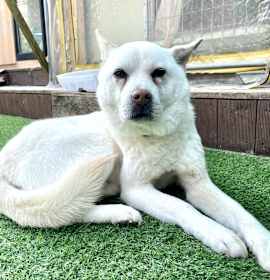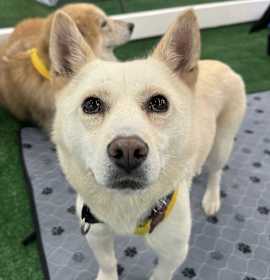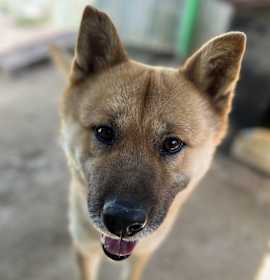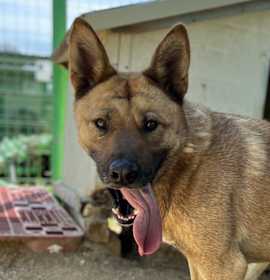Yes, Thai Ridgebacks shed, but they shed minimally. They require very minimal grooming, as their coats are short and “wash ‘n’ wear.” An occasional brushing will keep this breed’s coat looking healthy.
Thai Ridgeback
Breed Type: Asian and Oceanian
Common nicknames: Ridgeback
Coat: Smooth
Hypoallergenic: No, they will likely trigger allergies.
Temperament: Gentle, loyal, intelligent, independent
Life expectancy: 12-14 years
Color & patterns:

The Thai Ridgeback is known for their distinctive ridge of hair along their backs, which sets them apart from the pack. Originating in Thailand, these medium-sized, muscular dogs have a rich history dating back centuries. Originally bred to be versatile working dogs, they excelled in various tasks such as hunting, guarding, and even cart pulling. Today, Thai Ridgebacks are known for their loyalty, protective nature, and strong bonds with their human families. The Thai Ridgeback is a loyal and independent companion, always up for an adventure and ready to explore the world by your side. So, if you’re seeking a pup who can keep up with your active lifestyle, the Thai Ridgeback might just be the perfect match for you.
Thai Ridgeback characteristics
Learn about about Thai Ridgeback basics like their fur colors, shedding levels, how much grooming they need, and other Thai Ridgeback facts.
Average height
20-24 inches (50.8-61.0cm)
Average weight
35-75 pounds (15.9-34.0 kg)
Average lifespan
12-14 years
Exercise needs
Grooming needs
Full-grown size
Good with cats
Good with kids
Training Aptitude
What colors do Thai Ridgebacks come in?
Thai Ridgebacks come in black, fawn, tan, and blue. The most common color is a reddish-brown coat, often described as a rich chestnut or mahogany.
How big do Thai Ridgebacks get?
Thai Ridgebacks are medium to large-sized dogs, most weighing 35 to 75 pounds and standing around 20 to 24 inches tall. Their size variation can be attributed to several factors, including genetics, diet, overall health and what their line was bred for. Some Thai Ridgebacks bred for hunting larger game might be larger, while those bred for guarding purposes might be a bit smaller.
Were Thai Ridgebacks bred to hunt lions?
No, Thai Ridgebacks were not bred to hunt lions. Unlike Rhodesian Ridgebacks, who were bred to track, corner, and hold lions at bay until hunters arrived, Thai Ridgebacks were developed for hunting smaller game, such as boar and deer. While both breeds share a ridge of hair along their backs, they hunted differently.
What dog group is the Thai Ridgeback under?
The Thai Ridgeback is classified under the “Hound Group” by the American Kennel Club (AKC).
How long do Thai Ridgebacks live?
Thai Ridgebacks typically live between 14 to 15 years. They have a sturdy genetic background shaped by surviving in tough environments, which has made them strong and resilient, helping them live longer and stay healthier compared to some breeds with more genetic issues from inbreeding.
Thai Ridgeback history
Learn about where this Thai Ridgeback came from!
Where are Thai Ridgebacks from?
Thai Ridgebacks originated in Thailand thousands of years ago, but their exact origins are a mystery. Proof of the modern version of the breed goes back almost 400 years. They lived and hunted alone for centuries and were also used as cart-pullers, hunters, and guard dogs. Today, this breed is very rare outside of Thailand.
Thai Ridgeback temperament
Learn about about the Thai Ridgeback temperament and how well they fit into your lifestyle, home environment, and family.
How much do Thai Ridgebacks bark?
Thai Ridgebacks do not bark much — they are a fairly quiet breed. Like all dogs though, individual personalities can vary, and some Thai Ridgebacks may bark more (especially given their history as guard dogs). Proper training and socialization can help manage and minimize any potential barking behavior.
Are Thai Ridgebacks good family dogs?
Yes, Thai Ridgebacks are good family dogs for the right family. These pups are a striking, loyal, devoted breed and are best matched with an experienced pet parent who can provide the type of consistent, firm socialization and training that this breed needs to be a successful family companion. Years of living independently in the wild means they are naturally clever problem-solvers, but their self-reliant nature will need to be adequately harnessed and guided.
Are Thai Ridgebacks good with cats?
No, many Thai Ridgebacks do not do well with cats because they have a high prey drive. However, introducing your Thai Ridgeback to a cat gradually and under controlled circumstances is key as it allows both the dog and the cat to become familiar with each other’s scent and presence without feeling threatened. Positive reinforcement techniques, such as rewarding calm behavior around the cat, can also help reinforce good habits.
How smart are Thai Ridgebacks?
Thai Ridgebacks are smart dogs with keen awareness and problem-solving abilities. While these pups may not top the list like some highly trainable breeds, such as Border Collies or Poodles, they are certainly above average in intelligence.
Are Thai Ridgebacks easy to train?
No, the Thai Ridgeback is not considered easy to train and is best suited for an experienced dog trainer. Like most ancient breeds who lived independently for centuries, they may become bored with repetitive exercises. Early socialization and obedience training are important to help them develop good manners and behaviors. It's also worth noting that training any dog takes substantial time and effort, regardless of breed.
Are Thai Ridgebacks good with kids?
Yes, Thai Ridgebacks can do well with kids. The Thai Ridgeback is naturally gentle with and protective of children. Proper training, socialization, and positive reinforcement play crucial roles in shaping a Thai Ridgeback’s behavior around children. Teaching children how to properly approach and handle dogs is also crucial to ensure positive experiences for both the dog and the child.
As with any breed, it is recommended that your child is always supervised when interacting with your Thai Ridgeback to keep both the child and dog safe.
Thai Ridgeback health
Learn about about the Thai Ridgeback health outlook and what diseases they may be prone to at various stages of their life.
Do Thai Ridgebacks have a lot of health problems?
Thai Ridgebacks are hardy and mostly very healthy due to their long and diverse genetic history. However, like all breeds, they may be prone to certain health conditions that can affect dogs in general.
Hip dysplasia: Hip dysplasia is one of the most common skeletal diseases seen in dogs. It occurs when the hip has grown abnormally or is misshapen. The abnormal shape prevents the joints and sockets from properly meeting one another, resulting in rubbing and grinding instead of sliding smoothly.
Elbow dysplasia: This condition often results in pieces of bone and/or cartilage breaking loose and irritating the joint tissues. Over time, the rubbing from dysplasia can cause a variety of issues, such as pain, lameness, and secondary osteoarthritis. Surgery can be done to fix the joint if diagnosed before the onset of arthritis. If you are rescuing a Thai Ridgeback, have them checked out by a vet to see if they have or are prone to getting dysplasia so you know what they will be able to handle in terms of activities and exercise.
Dermoid sinus cyst: A genetic skin disorder caused by a neural tube defect. The neural tubes are meant to drain dead cells, tissues, and hair from the body. When the tubes are not formed correctly, they present as a bump or series of bumps along your dog’s spine. There is usually a mild discharge coming out from the bumps and they may become infected.
Find Thai Ridgeback puppies near you
Adopting a Thai Ridgeback
We don't see any Thai Ridgebacks available for adoption in your exact location or cities near you, but here are some adorable similar breeds in Beverly Hills, CA.

Buddy
Rhodesian Ridgeback Carolina Dog
Male, 2 yrs 1 mo
Los Angeles, CA
Good with dogs
Good with cats
House-trained
Spayed or Neutered
Shots are up-to-date

Cady
Jindo Retriever (Unknown Type)
Female, 2 yrs 1 mo
Los Angeles, CA
Good with dogs
Not good with cats
Spayed or Neutered
Shots are up-to-date

Bianca
Jindo Retriever (Unknown Type)
Female, 2 yrs 1 mo
Los Angeles, CA
Good with dogs
Not good with cats
Spayed or Neutered
Shots are up-to-date

Otis
Jindo Jindo
Male, 5 yrs 7 mos
Los Angeles, CA
Good with dogs
Not good with cats
Spayed or Neutered
Shots are up-to-date

Teddy
Jindo Spitz (Unknown Type, Medium)
Male, 5 yrs 2 mos
Los Angeles, CA
Good with dogs
Not good with cats
Spayed or Neutered
Shots are up-to-date

Hotaru IN LA!!
Jindo Shiba Inu
Female, 5 yrs 6 mos
Los Angeles, CA
Good with dogs
Not good with cats
House-trained
Spayed or Neutered
Shots are up-to-date

Duke
Jindo Jindo
Male, 7 yrs 8 mos
Los Angeles, CA
Good with dogs
Not good with cats
Spayed or Neutered
Shots are up-to-date

Thunder
Jindo German Shepherd Dog
Male, 6 yrs 11 mos
Los Angeles, CA
Good with dogs
Not good with cats
Spayed or Neutered
Shots are up-to-date

Buddy
Rhodesian Ridgeback Carolina Dog
Male, 2 yrs 1 mo
Los Angeles, CA
Good with dogs
Good with cats
House-trained
Spayed or Neutered
Shots are up-to-date

Cady
Jindo Retriever (Unknown Type)
Female, 2 yrs 1 mo
Los Angeles, CA
Good with dogs
Not good with cats
Spayed or Neutered
Shots are up-to-date

Bianca
Jindo Retriever (Unknown Type)
Female, 2 yrs 1 mo
Los Angeles, CA
Good with dogs
Not good with cats
Spayed or Neutered
Shots are up-to-date

Otis
Jindo Jindo
Male, 5 yrs 7 mos
Los Angeles, CA
Good with dogs
Not good with cats
Spayed or Neutered
Shots are up-to-date

Teddy
Jindo Spitz (Unknown Type, Medium)
Male, 5 yrs 2 mos
Los Angeles, CA
Good with dogs
Not good with cats
Spayed or Neutered
Shots are up-to-date

Hotaru IN LA!!
Jindo Shiba Inu
Female, 5 yrs 6 mos
Los Angeles, CA
Good with dogs
Not good with cats
House-trained
Spayed or Neutered
Shots are up-to-date






